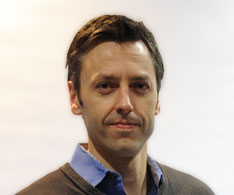 The 1631 eruption of Mt. Vesuvius—the famed volcano situated outside the city of Naples, Italy—altered more than just the natural landscape of the Italian coast; it left a cultural mark by becoming the first natural event in modern history to be scientifically documented by human observers, according to Associate Professor of History Sean Cocco.
The 1631 eruption of Mt. Vesuvius—the famed volcano situated outside the city of Naples, Italy—altered more than just the natural landscape of the Italian coast; it left a cultural mark by becoming the first natural event in modern history to be scientifically documented by human observers, according to Associate Professor of History Sean Cocco.
In his new book, Watching Vesuvius: A History of Science and Culture in Early Modern Italy (University of Chicago Press, December 2012), Cocco tells the story of Mt. Vesuvius through historical records of the volcano left by Renaissance-era scholars during what is considered to be the first period of modern scientific discovery.
Mt. Vesuvius had been dormant since the 12th century until 1631. Because of this long period of inactivity, said Cocco, the eruption was recognized first by scholars of history who were knowledgeable of ancient texts. “There was the famous eruption that destroyed the Roman cities of Pompeii and Herculaneum, and this would have been on the minds of Renaissance humanists,” he explained.
 Cocco became interested in Vesuvius more than 12 years ago when he discovered a letter by a man in Naples written to his brother in Rome, days after the December 16, 1631 eruption of Vesuvius. “The man had woken, like thousands of others, to a volcano erupting less than six miles away, and he registered that what he was looking at was exactly what the ancient Romans had seen,” Cocco said. “He had a very historical understanding of nature, and he used this knowledge of the past to understand modern events.”
Cocco became interested in Vesuvius more than 12 years ago when he discovered a letter by a man in Naples written to his brother in Rome, days after the December 16, 1631 eruption of Vesuvius. “The man had woken, like thousands of others, to a volcano erupting less than six miles away, and he registered that what he was looking at was exactly what the ancient Romans had seen,” Cocco said. “He had a very historical understanding of nature, and he used this knowledge of the past to understand modern events.”
Although modern volcanologists largely dismiss the scientific merit of these documents, Cocco argues the opposite, citing the complexity and thoroughness of the historical accounts highlighted in Watching Vesuvius. “The eruption was not met with superstition—people from Europe had been exploring Central America during this time and had encountered volcanoes there. Natural philosophers—the scientists of the day—also theorized that earthquakes and eruptions operated something like weather in the system of nature. These accounts show that educated people during the 17th century had a complex understanding of natural causation. They had a sophisticated sensibility of landscapes and nature and the ways that human beings relate to them. In many ways, the observations that these people made were admirably precise.”
Cocco was interviewed about Watching Vesuvius for the spring 2012 issue of the Trinity Reporter. Read the full interview here.




